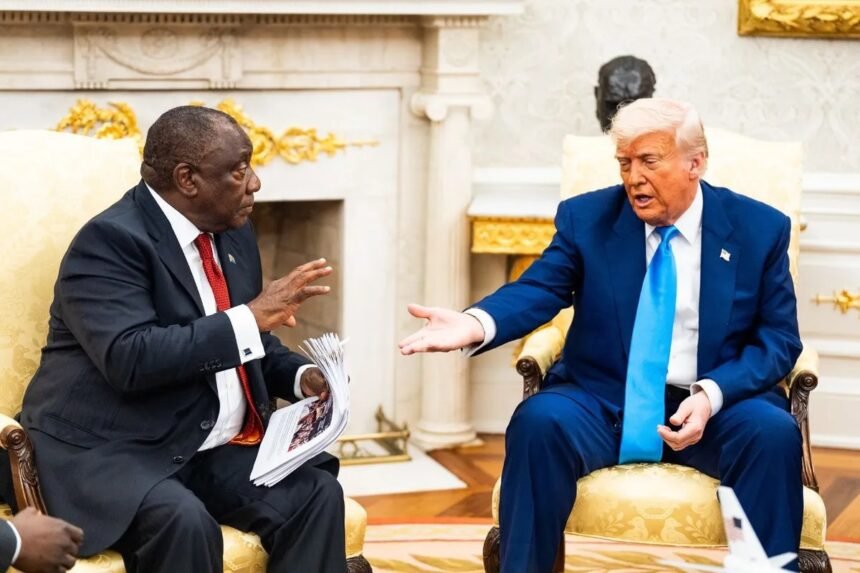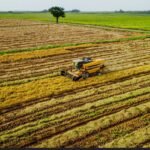South Africa’s exports to the United States will face a steep 30% tax starting 7 August. The announcement, made by President Donald Trump, has sent shockwaves through South Africa’s trade and business communities. This is the highest tariff rate imposed on any African country.
The move is a major setback for South Africa. The US is the country’s second-biggest trading partner, and many South African goods, especially cars, wine, and agricultural products, have been entering the US duty-free under the African Growth and Opportunity Act (AGOA). Agoa was created in 2000 to help African countries grow their economies through trade with the US.
Trump’s decision appears to end that special trade status for South Africa. Although Agoa is not officially cancelled, it is due for review in September, and this announcement suggests the US may no longer support the deal.
South Africa is not alone in being hit with new tariffs. Nigeria, Ghana, Zimbabwe, and Lesotho will now face a 15% tax. North African nations Algeria and Libya will also see their exports taxed at 30%. Tunisia faces a 25% tariff. Kenya and Ethiopia received the lowest rate at 10%.
The US government says the new tariffs are meant to protect American businesses and create more jobs at home by making imported goods more expensive.
But South African officials say the move is politically motivated. Relations between the US and South Africa have worsened since Trump took office. Earlier this year, the US cut off all aid to South Africa, claiming the country discriminates against its white minority, an accusation President Cyril Ramaphosa has strongly denied.
In May, Ramaphosa met with Trump to try and fix the strained relationship. But the talks led nowhere. More recently, Trump said he might skip the G20 Summit in Johannesburg later this year, adding, “I’ve had a lot of problems with South Africa. They have some very bad policies.”
Before the new tariffs were announced, South Africa had been working hard to avoid them. Reports suggest that the government offered to buy more US liquefied natural gas, ease rules for American poultry imports, and invest more than $3 billion in US industries like mining.
Now that the tariffs are going ahead, President Ramaphosa says talks will continue. He also said the government is preparing support for businesses that will be hit hardest.
Some products will be exempt from the new tariffs, including copper, pharmaceutical goods, semiconductors, stainless steel scrap, some minerals, and energy products.
Still, many industries are expected to suffer. South Africa’s wine producers say they are at a major disadvantage. The US is the fourth biggest buyer of South African wine, and the 30% tariff makes it harder to compete with wines from countries facing lower tax rates. The South African Wine association has urged both governments to quickly find a solution to prevent job losses and falling investment.
Lesotho is also facing serious challenges. The country has long relied on Agoa to sell clothes to the US. Its factories produce jeans and sportswear for brands like Levi’s, Walmart, and JC Penney. The textile industry is Lesotho’s biggest private employer.
Even though Lesotho avoided the threatened 50% rate, its new 15% tariff is still a big problem. Trade Minister Mokhethi Shelile told the BBC, “Our textile industry will not be able to compete at all.” Some factories are already laying off workers or closing down.
One Lesotho-based company, TZICC, which makes garments for US brands, said the new tariffs are damaging orders and putting buyers off.
Meanwhile, Kenya’s government welcomed the news that it received the lowest tariff rate among African countries with similar exports. Kenya said it is committed to growing its trade relationship with the US and wants to protect the long-standing ties between the two countries.
As the tariffs come into effect, the pressure is growing on African governments to respond. For many countries, the loss of Agoa benefits could lead to job cuts, factory closures, and weaker economies.
The coming months will be critical as South Africa and others look to find new deals or support measures to protect their industries and workers from the fallout of this major shift in US trade policy.










